- Home
- Nancy Pickard
Twilight Page 6
Twilight Read online
Page 6
“Two people?” I said. “Do you mean the person who was killed in the snowstorm last winter?”
“No, I mean last Memorial Day weekend. There was a child, a little girl, who was also struck and killed by a car. Hit-and-run driver. She died, too, just like Ben.”
“Oh, that’s right!” I tended to avoid news stories having anything to do with God’s Highway, so unhappy were my own memories of that battle for its creation twelve years earlier, but I certainly remembered that one, and I wondered why Nellie hadn’t reminded me of it. “The child wasn’t from here, though, was she?”
“No. I don’t know where she was from. I don’t know anything about her. But I know she was killed in the same way at the exact same intersection where Ben died, down from Nellie’s house. Except hers was hit-and-run. The bastard! We know who murdered Ben, and she’s going to pay for it. But other people are going to die there, too, unless we do something to close that trail.”
After a moment, I said, “Would you be satisfied with anything less?”
“What do you mean?” She snapped it, aggressively.
“Improving it, somehow, finding a way to make that intersection safer. Closing down the trail entirely, that’s like taking on the legislature and the environmentalists and the legal establishment, all over again. And there’s no reason to think they’d lose this time, either. It would affect an awful lot of people, are you sure you want something so drastic?”
She gazed out the window again, her voice trembling now, with a kind of quiet grief that seemed to alternate with her avenging fury. “It’s so lovely, on the trail. There are miles and miles of paths now that wind through forests and farms, and there’s even that bit of seashore, where the old railroad ran along the coast on top of the bluffs. Ben and I used the trail from the very first day it opened, and we started taking the kids as soon as we could strap them onto our backs …”
After a moment, I said, “I’m so sorry.”
She nodded, helplessly.
“You have children?”
“Two boys …” The grief swung again to anger. “Nellie says you have this new foundation. She says you can move faster than governments can, and you’ve got money and influence. We need your help to save lives. And we have to do it quickly. My God! Somebody else could die on God’s Highway, even today! Right now, as we’re sitting here, somebody could be out hiking on that trail, completely unaware of the danger, and he could walk out onto the road and that intersection and get hit and killed, just like—” Her pretty face twisted with grief. “Ben.” She leaned back against the love seat, resting her head on the edge of it, closing her eyes. “I’m so tired. I don’t sleep anymore, and yet I feel as if I could sleep forever. Maybe I have to close that trail down before I can sleep again. Just shut the fucker down and close it for good.”
“Do you know about the festival we’re sponsoring?” I asked her.
“Yes.” Eyes still closed, head still resting on the love seat.
“I can’t do anything for you until that’s over.”
Her eyes came open. She looked trapped, defeated.
“And maybe not even then,” I warned her bluntly. “What I can do, maybe even today, is begin to look the situation over. Talk to my board of directors. Decide if this is something for us to get involved in. I don’t know if it is, Melissa. But at least I’ll find that out and get back to you with a decision as soon as possible.”
“Not this week?”
“Yes, probably this week.”
“Really?” She pushed herself up straight, using her palms against the seat. “You’ll do that? Nellie said you’d help.”
I shook my head. “I don’t think it’s much.”
Her mouth twisted. “You don’t know. Compared to what I’ve run into with other people. Nellie’s own daughter, for instance. She won’t even approach the town council for me. Or our legislators, they’re not interested, they say it’s not that big a problem. What do they want, ten people dead? Twenty? How many deaths are a problem? And that other foundation, the one that funded the trail to begin with … they won’t help, they already said so.”
“Did they?”
“You’re the only one so far. Because of Nellie, right?”
I chose not to answer that, but shifted in my seat, instead, hinting that I had other things I had to do. She took the hint, gathering herself together and rising to her sandaled feet With a quick thank-you and a handshake, she was finished and quickly gone through my office door, which I held open for her. I expected her to turn left, to go toward the parking lot, but she turned right toward the front door, instead.
Cleo was just stacking the last box as Melissa left the house.
And then it was good-bye to my delivery woman, as well.
I walked slowly to the door, attempting to manage it without a limp, to watch. I saw Cleo climb into her brown van. And Melissa get into the white Dodge van with the bicycle rack on top.
I frowned at that surprising sight, because it meant she was here, in the house, when I had taken my tumble outside on the street. And if she’d been staring out the window, as she had been when I found her, she’d have certainly seen me. Yet she’d said nothing, hadn’t asked if I was hurt—although maybe it was fairly obvious I’d survived—and certainly hadn’t jumped to my assistance at the time, as Cleo had. One would have thought, considering her passionate desire to keep people from getting hit by cars …
The responses to deep grief were unpredictable, I decided.
I looked at my watch: 12:15. Cleo was slow today; it had taken her an unusually long time to stack those few boxes. To hear her tell it, that meant she was going to get hung by some of the customers on her route. And I was late to lunch with my husband, who was standing just behind me leaning against the foyer wall, silently staring at me, as I turned around to smile at him.
“What?” I demanded.
“It looks good on you, Jenny.”
“Yeah? What does?”
He raised his hands, gesturing toward the walls, the ceiling. “All of this. You’re very attractive when you’re in charge.” He smiled, crooking one corner of his mouth up in the way that still made me want to kiss him—right there on that uptilted, sexy corner of his lips—after all our years of being together. “Lead me,” he said. “Direct me. Take me to lunch.”
He stepped forward for a greeting kiss, and I didn’t stop him in time from reaching out to squeeze me in a warm, loving embrace. “Oh,” I moaned, which he unfortunately took for ardor, thereupon squeezing me even tighter, so that my breath finally exploded from his boa-hug in a frantic, “Ouch!”
5
I LOVED THE MAN, GEOFFREY BUSHFIELD, THE BIG HANDSOME FELLOW I sat next to in a tight booth at the Buoy Bar & Grill for lunch that day. We’d known of each other as far back as high school—he, four years my senior—and we’d been wed about seven years now, which was his longest running show in three marriages. He was a former near-juvie turned cop. Smart, funny, sexy. My man.
None of which prevented him from driving me crazy now and then.
First, he was furious with Pete Falwell:
“That bastard!”
Geof swore in a string of expletives, truly upset and clearly shaken by my tale, perhaps more than I was, myself. I had tried to lighten the telling of it, so that it wouldn’t scare my husband on my behalf. But he, no fool, didn’t need a translator to point out to him that Pete could have killed me. One inch more and my head could have been just another lifeless cobblestone. As a longtime cop, Geof had seen his share of bloody encounters between vehicles and pedestrians; he knew who got the worst of them. No doubt, those images fueled his explosive reaction—not to mention that he knew, more than anybody, how very many other ways Pete had hurt my family in the past. This was one more. A near-miss, but still a direct hit.
“That idiot!” Geof pounded the wooden dining table in front of us, causing a few people to glance up from their crab salads. I placed one of my hands over his angry fist, wanting to calm him,
to reassure him that I was still here. “That cold-blooded bastard! He should lose his license! I’ll have a tail on Pete Falwell so tight, if he doesn’t make a full stop on red before turning right we’ll have him in traffic court for reckless endangerment. I’ll—”
It upset me, to have upset him.
I wanted him to calm down. He was making me feel jittery, reminding me that I’d come closer than I wanted to admit to possibly serious injury. I’d been taking it lightly up till then, and I wanted to keep it that way. There was nothing to gain, for me, in making more of the accident than it really was. Pete had barely bumped me, that was all. I’d fallen and gotten up.
It took me until our lunches arrived to calm Geof down.
Then I made the mistake of telling him about Mr. Tarantula.
“Call Nellie Kennedy,” he said, speaking in a normal voice now, although it was the normal one he used as a lieutenant to direct officers of lower rank. He glanced at me over a crab salad sandwich that was stuffed so fresh and so full it was nearly crawling out between his fingers. “Ask Nellie about it She’ll know.”
“Yes,” I agreed, over my own lobster version.
“But what about the black plastic spider rings?” he asked, sharply, as he might have asked, But what about the finger-prints on the kitchen door? “Why aren’t they here yet?”
“I don’t know, Geof.”
“Haven’t you called to check on them?”
“Not today.”
“Don’t you think you should?”
“I’ll give it one more day.”
“I wouldn’t wait. What about the Portsmouth—”
“No,” I said.
“Jenny, you’ve got to tell those people to get their rears in gear. Tell them this is an emergency, and you have to have those papers—”
“I have done that. Many times. With increasing frequency and volume. This morning, before I went to Nellie’s store, in fact.”
“Damn, you’d better call them again.”
“Geof.”
He looked up from his coleslaw, noticed the expression on my face, finally detected the tone of my voice, and said, “I’m doing it again.”
I bared my teeth at him, heedless of shreds of lobster.
“Yes,” I snarled.
He laughed, at himself, at me. “I’m sorry. It’s your festival. You can run it beautifully without me. I know that. Honest, I do.”
“Do you want to know what our niece says about boys?”
“I don’t think so, do I?”
“She says they always try to tell you what you already know.”
“Is that true? Goddamn, what a colossal pain in the ass I must be.”
The confession of which greatly endeared him to me.
“Actually,” I admitted, “I can’t do it without your help. Talk to me about the security arrangements. Fill me with confidence that your guys really can handle ten thousand strangers in one weekend.”
He was, as I mentioned, a lieutenant for the Port Frederick Police Department in real time, and I’d dragooned him into recruiting off-duty ofiicers for security work at the festival. He had also called in reinforcements from neighboring communities. Parking, alone, would be a logistical nightmare without them. I felt damned fortune that the cities involved were willing to pay all the extra overtime. They believed, as I did, that the civic benefits would outweigh the cost.
After Geof reviewed for me the numbers and assignments of the constabulary, I said, “You may have one more security problem to watch out for. When I was at Nellie’s store today, those Halloween protestors were there, you know the ones I mean?”
Expressively, his mouth full, he rolled his eyes.
“Yeah, well, Ardyth sicced them on me. She practically introduced me as the devil’s wife. Insisted on calling it the Halloween Festival, said it was all my idea—”
He swallowed. “Accurate, if not helpful.”
“And she got her licks in at the mayor, too.”
“You think these people will cause problems?”
“I got the feeling they’ll be there.”
“As nuts go,” Geof observed, “they’re pretty quiet”
“I guess I’m concerned about what other people might do. With such a huge crowd, the protestors might draw opposition, or even more … aggressive … versions of themselves. And dammit, I just don’t like the idea of anybody trying to take the fun out of it for little kids.”
“Like you.”
I smiled. “Right.” I thought about telling him about the El Greco protestor putting the scratch on my arm. But considering Geof’s reaction to the little bit of damage that Pete had done to me … I decided I just didn’t want to deal with how he might react to somebody who’d threatened me with torture and eternal damnation.
That, I decided, should wait for a calmer day.
He was saying, relaxed and full of stomach and enjoying himself now, “Taking the fun out of things is not against the law, Jenny.”
“Ought to be.”
He smiled, amused. “Damn right.”
“I guess we’d have to build too many new prisons, huh?”
“Probably. Although …” He looked thoughtful. “I suppose we could just fry ’em.”
“Death penalty for party poopers?”
“Why not? They’re already under their own life sentence.”
A philosopher, my husband. He was skeptical, though, of my fears about the protestors.
“I know,” I said, “it’s unlikely. I’m only saying, tell your guys to be aware of these people. That’s all. And not to provoke anything. The outside cops won’t be aware, as we are, that these are okay folks, unless you tell them so.” I looked at him. “You think they’re nuts?”
“Sure. You don’t?”
“Yeah, I do, but from their point of view there’s logic to what they do. Maybe even courage.”
“You civil libertarian, you. You should have gone to college in the sixties, Jen.” The tough cop was teasing the do-gooder. “You’d have fit right in.”
“Nah, I’d look awful in long skirts and granny glasses.”
He laughed. “I tried to duplicate the sixties. All those drugs I tried when I was a kid.”
“It accounts for a lot,” I agreed, the Nice Girl teasing the Bad Boy.
We both laughed. It was great, working downtown, seeing more of him. After a few moments of companionable eating, I said, “Geof? Remember God’s Highway?”
“Why, is it gone?”
“Very funny. When it was created, I mean. Ten years ago, more or less. That was before you and I were joined in holy matrimony—”
“Or even unholy bliss.”
My smile slid into a lascivious grin of memory. “I’ll say. Were you for it, or against it?”
“I was agin it.”
He said it with so much force he surprised me. And then he had more to say on the subject: “I hate idealism. I especially hate it when it puts other people in danger and causes more work for me.”
“The trail did that?”
“I was afraid it would. I figured, we all did, all of us retrograde old cops, that a hiker’s trail like that, with a lot of isolated miles, would attract some people who aren’t exactly modeled on Henry David Thoreau or Rachel Carson.”
“Gangs? Muggers, you mean? Rapists?”
“That fraternity, yes.”
“And has it?”
He looked annoyed. “Not much, no.”
I laughed at him.
“You know I hate to be wrong,” he said, smiling at me.
“That’s because you’re an idealist, at heart.”
He placed his hand on his chest. “Woman, you wound me.”
“All cops are idealists, aren’t they? Why else would you do it?”
“For the money,” he said and grinned. “Of course.”
“I’m as idealistic as anybody you’ll ever know.”
“No, you’re not,” he said. “But don’t ask me to prove it.”
&nb
sp; An old joke between us. “I would never do that.”
“There have been a few problems,” he said, “here and there along the trail, over the years. It’s a lot of ground to try to patrol. I don’t know how they thought we’d manage that, all these different jurisdictions, for one thing, not enough officers, for another. No way the Park Service can take care of it without our help. All those people who wanted it, they thought only nice people hike, I suppose.”
“Who’s the ‘they’ we’re speaking of?”
“Everybody who supported it. Your favorite foundation president, Peter Falwell, the people in First Things First—”
That was the name of a national conservancy group that had rallied to our local cause, bringing their considerable clout down on the side of God’s Highway. I had surprised myself by detesting them. Normally, me being me, I’d have expected to take up the cudgel of any “good cause,” like a nature trail, but I’d been offended by their cavalier attitude toward the rights of the people along the trail, some of whose families had held their property for generations. I hadn’t cared if they’d held it since the dawn of time or only a day—no matter how long their tenure, it was theirs, by right of contracts signed in good faith many years before. Dammit.
“Jenny?” Geof waved a French fry in front of my face. “Where’d you go? You were listening, and then I lost you.”
“Fond memories of First Things First,” I said wryly. Thank God, those people had never come back to town. “I’m sorry. What were you saying?”
“We’ve actually had an increase in incidents on the trail lately. Minor thefts—backpacks being stolen, fanny packs, that kind of personal thing—and a little vandalism—trees being chopped up and carted away, maybe for firewood, and fence posts disappearing. There’s been some breaking and entering in houses along the trail, nothing vicious, nothing very important taken. A little money, some clothes, cupboards rifled. No TVs, or VCRs or jewelry, nothing that amounts to anything, at least from the police point of view. I’m sure it upsets the owners, all the same. However major or minor it is, it’s increasing. Sounds to me like a combination of local teenagers on the loose and maybe a few bad apples on the trail, passing through and picking off any visible loot as they go. Not much we can do about them, but the teenagers—if that’s what it is—maybe.”

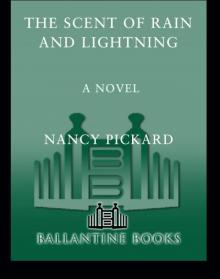 The Scent of Rain and Lightning
The Scent of Rain and Lightning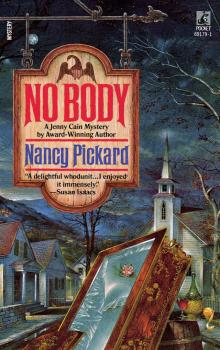 No Body
No Body The Secret Ingredient Murders: A Eugenia Potter Mystery
The Secret Ingredient Murders: A Eugenia Potter Mystery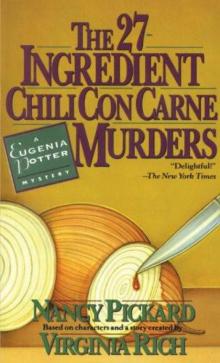 The 27-Ingredient Chili Con Carne Murders: A Eugenia Potter Mystery
The 27-Ingredient Chili Con Carne Murders: A Eugenia Potter Mystery Twilight
Twilight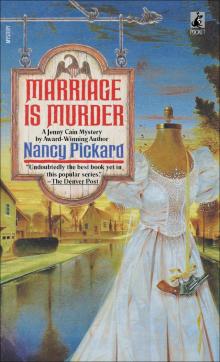 Marriage Is Murder
Marriage Is Murder I.O.U
I.O.U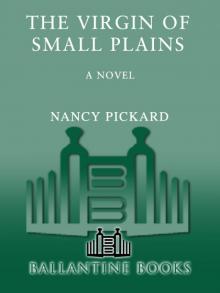 The Virgin of Small Plains
The Virgin of Small Plains Generous Death
Generous Death The Whole Truth
The Whole Truth The Blue Corn Murders
The Blue Corn Murders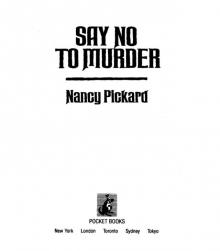 Say No to Murder
Say No to Murder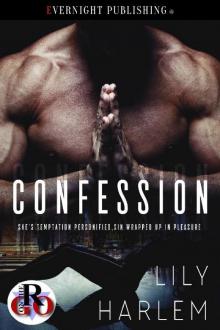 Confession
Confession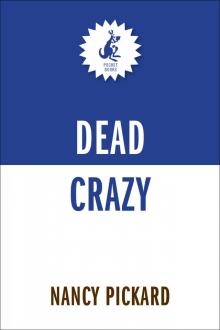 Dead Crazy
Dead Crazy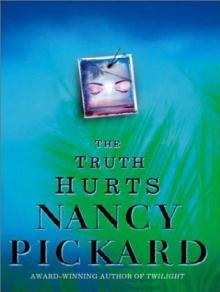 The Truth Hurts
The Truth Hurts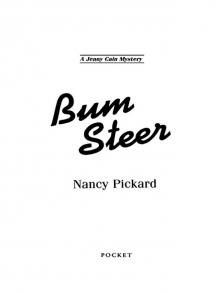 Bum Steer
Bum Steer